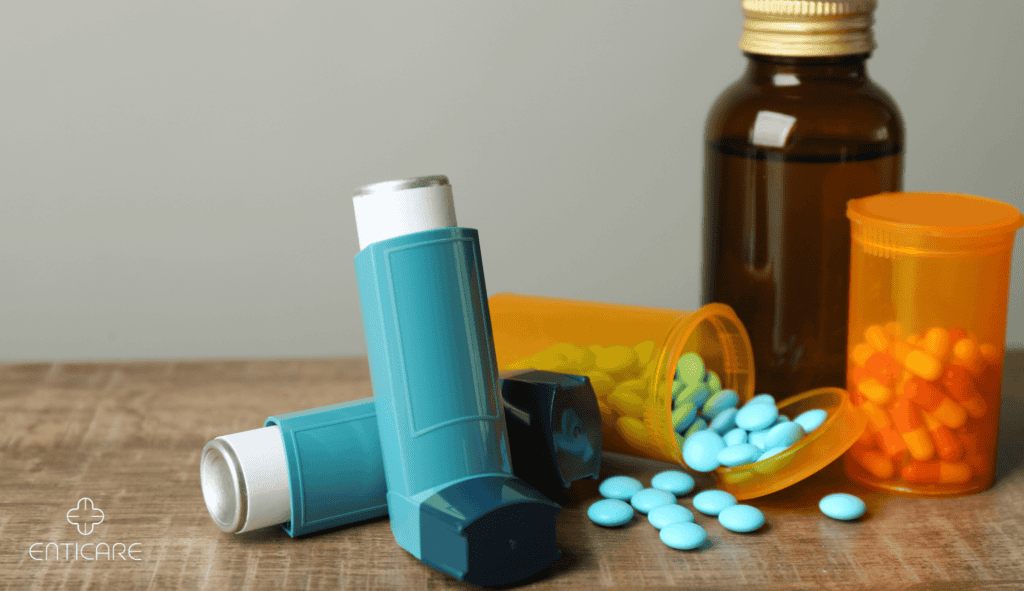Allergies can range from a minor annoyance to a severe medical emergency, depending on the body’s reaction to allergens. For many people, symptoms like sneezing, runny nose, or itchy eyes, often associated with seasonal allergies, can be managed with over-the-counter medications. However, there are times when seasonal allergy symptoms escalate, requiring urgent care.
In this blog, we’ll walk through the signs and symptoms that indicate when a trip to urgent care is necessary, how urgent care can help, and what you should do in the meantime to manage allergy symptoms effectively.
Understanding Allergies: When Are They Dangerous?
Allergic reactions occur when your immune system overreacts to a substance that is usually harmless. Allergic rhinitis, for example, is a condition where the immune system reacts excessively to common allergens such as pollen and mold. While common symptoms like itching and nasal congestion are frustrating, they typically don’t require immediate medical attention. However, certain reactions can quickly become life-threatening if not treated promptly.
Identifying and avoiding allergy triggers, such as pollen, dust mites, and pet dander, is crucial for managing allergy symptoms effectively. Practical tips include staying indoors during high pollen counts and maintaining a clean home environment.
If you or someone you love has allergies, it’s important to recognize when the situation requires urgent care intervention.

Common Allergy Symptoms That Don’t Need Urgent Care
Most allergy symptoms are mild and can be managed at home. These symptoms generally do not require urgent care, but knowing when to monitor their progression is essential.
Nasal Congestion and Sneezing
Mild nasal congestion, sneezing, or a runny nose are classic signs of environmental allergies, such as pollen or pet dander. These symptoms are uncomfortable but can usually be controlled with over-the-counter antihistamines or nasal sprays.
Itchy Eyes and Skin Rashes
Itchy, watery eyes and mild skin rashes, such as hives or eczema, are common reactions to allergens like pollen or pet dander. While irritating, these reactions rarely need urgent care and can be managed with allergy medications or topical treatments.
Coughing and Post-Nasal Drip
Many people experience mild coughing or a post-nasal drip as part of their allergic reaction. In most cases, these symptoms clear up with medications like decongestants or antihistamines.
When Allergies Worsen: Signs You Should Head to Urgent Care
Some allergic reactions can escalate beyond mild symptoms, with severe symptoms indicating a serious medical condition that requires urgent care. Understanding these signs can help you make an informed decision about when to seek help.
If you experience severe symptoms, seek medical attention immediately.
Severe Swelling or Hives
Large areas of swelling, especially on the face, lips, or around the eyes, indicate a more serious allergic reaction. If the hives cover a large portion of the body or are accompanied by other symptoms like difficulty breathing, urgent care may be necessary.
Persistent Wheezing and Shortness of Breath
Allergies can lead to respiratory issues, particularly in those with asthma. If you experience wheezing or shortness of breath that doesn’t improve with inhalers or other medications, this could signal a more severe allergic reaction and require immediate attention.
Non-Responsive Allergy Medications
If you’ve been using allergy medications but your symptoms continue to worsen or new symptoms develop, this could indicate that your body is having a stronger allergic reaction than usual. Seeking care early can prevent the symptoms from escalating further.

Allergy-Related Emergencies: When to Seek Immediate Help
In some cases, an allergic reaction can become life-threatening, especially if it escalates into a severe reaction. Symptoms of a severe reaction include swelling, rapid heartbeat, and confusion, and may require immediate care in an emergency room rather than urgent care. Knowing the difference between an urgent situation and an emergency can save lives. If urgent care is not sought promptly, further complications can arise, leading to additional health issues.
Anaphylaxis: A Life-Threatening Severe Allergic Reaction
Anaphylaxis is the most severe form of allergic reaction and can occur within minutes of exposure to an allergen. Symptoms include swelling of the throat, difficulty breathing, a drop in blood pressure, rapid pulse, and loss of consciousness. If you or someone else shows signs of anaphylaxis, use an epinephrine auto-injector (like an EpiPen) and go to the emergency room immediately.
Severe Asthma Attacks Triggered by Allergies
For individuals with asthma, certain allergens, such as pollen, dust mites, or mold, can trigger severe asthma attacks. These attacks cause the airways to constrict, making breathing extremely difficult. If a severe asthma attack occurs and breathing doesn’t improve with a rescue inhaler, urgent or emergency care is needed.
Vomiting or Diarrhea from Food Allergies
In cases of food allergies, reactions such as vomiting, diarrhea, or stomach cramps can occur. If these symptoms are severe, they may be a sign of a serious reaction and require urgent or emergency care.
What to Expect at Urgent Care for Allergies
Urgent care centers and urgent care clinics are equipped to handle moderate allergic reactions that don’t require the intensive care of a hospital but still need prompt medical attention.
Medications and Treatments Available
Urgent care providers often treat moderate allergic reactions with medications like corticosteroids, antihistamines, or epinephrine (if necessary). They may also provide breathing treatments if the patient is experiencing respiratory distress.
Allergy Testing and Diagnosis
If you frequently suffer from severe allergies, the urgent care provider may recommend allergy testing. These tests can identify specific allergens and help tailor treatment plans that prevent future reactions.
Referrals to Specialists
In some cases, the urgent care provider may refer you to an allergist for further evaluation and long-term treatment options, especially if the allergic reactions are becoming more frequent or severe.
How to Manage Allergies and Avoid Future Urgent Care Visits
Proper management of your allergies can help prevent the need for urgent care. Identifying and avoiding allergy triggers, such as pollen, dust mites, and pet dander, is crucial. Taking preventive measures and knowing how to react quickly to allergic symptoms can make a huge difference in maintaining your quality of life.
Avoiding Known Allergens and Seasonal Allergies
The most effective way to prevent allergic reactions is to avoid the allergens that trigger them. This might mean using air purifiers, staying indoors when pollen counts are high, or avoiding certain foods if you have food allergies.
Using Allergy Medications Consistently
Many people find relief from the consistent use of over-the-counter or prescription allergy medications, such as antihistamines or nasal sprays. Regular use can help keep symptoms under control and reduce the risk of more serious reactions.
Carrying Emergency Medications
If you know you are at risk for severe allergic reactions, carrying emergency medications like an epinephrine auto-injector can save your life. Make sure family members, coworkers, or teachers know how to use it in case of an emergency.
Don’t Wait to Seek Help for Allergies
Allergies can be unpredictable and range from mild to life-threatening. Understanding when to seek urgent care can help you prevent a worsening reaction and keep you safe. If you experience any of the serious symptoms described above, seek medical attention immediately. Don’t hesitate to seek medical help.
If you need long-term allergy management or have concerns about your symptoms, schedule an appointment with our allergy specialists today. Our team will work with you to identify triggers, create a treatment plan, and help you avoid future allergic reactions.
👉 Schedule your appointment here for expert allergy care and support.


